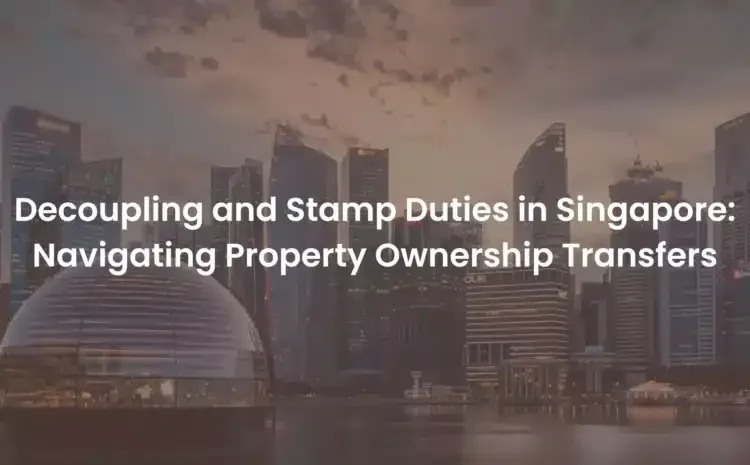Decoupling and Stamp Duties in Singapore: Navigating Property Ownership Transfers
Introduction:
Singapore’s real estate market has been a hot topic of discussion for both residents and investors alike. With the aim of curbing speculation and stabilizing property prices, the government has implemented various measures, including stamp duties and regulations on property ownership transfers. One such strategy that has gained attention is decoupling, allowing individuals to transfer property ownership without incurring additional taxes. In this blog post, we will explore decoupling and stamp duties in Singapore, understanding their purpose, implications, and how they impact property owners.
Understanding Stamp Duties:
Stamp duties are taxes levied on documents relating to the transfer of ownership or interest in immovable properties. In Singapore, property transactions attract several stamp duties, including Buyer’s Stamp Duty (BSD) and Additional Buyer’s Stamp Duty (ABSD). BSD is imposed on the purchase of residential properties, while ABSD is an additional tax for certain groups of buyers, such as foreigners, entities, and Singaporeans buying their second or subsequent residential properties.
The Purpose of Stamp Duties:
The implementation of stamp duties serves several purposes. Firstly, they act as a deterrent against property speculation and flipping, ensuring stability in the real estate market. Secondly, they help to moderate housing demand and prevent excessive price increases, making homeownership more affordable for Singaporeans. Lastly, stamp duties generate revenue for the government, which can be channeled into public housing and infrastructure development.
Exploring Decoupling:
Decoupling is a strategy employed by property owners to transfer ownership of their property without triggering stamp duties. It involves the transfer of ownership between spouses or co-owners, allowing one party to relinquish their share while the other retains full ownership. By doing so, the remaining owner avoids incurring the ABSD or BSD that would have been applicable if the property were to be sold to a third party.
Implications of Decoupling:
Decoupling offers several benefits to property owners. Firstly, it enables couples to restructure their property ownership arrangements in the event of divorce or separation without incurring unnecessary taxes. It also allows property owners to take advantage of potential tax savings when upgrading or downsizing their homes. However, it is crucial to note that decoupling is subject to certain eligibility criteria and conditions, and seeking professional advice from a qualified lawyer or tax consultant is highly recommended.
Government Measures and Recent Developments:
To ensure the effectiveness of stamp duties and prevent abuse of the decoupling strategy, the Singapore government has implemented various measures. Over the years, the authorities have tightened the regulations surrounding stamp duties, including increasing the rates and extending the duration of ABSD for certain buyer profiles. These measures are aimed at maintaining market stability, preventing property speculation, and ensuring fair taxation.
Conclusion:
Decoupling and stamp duties play significant roles in shaping Singapore’s real estate landscape. While stamp duties deter speculation and stabilize property prices, decoupling provides property owners with flexibility during transfers of ownership. It is crucial for property owners to stay updated with the latest government measures and regulations to make informed decisions regarding their property investments. Engaging professional advice can help navigate the complexities of decoupling and ensure compliance with the prevailing laws. By understanding the intricacies of stamp duties and decoupling, property owners can make informed choices that align with their financial goals and aspirations.
Speak to our lawyers at 8780-2499 on decoupling and stamp duties.

